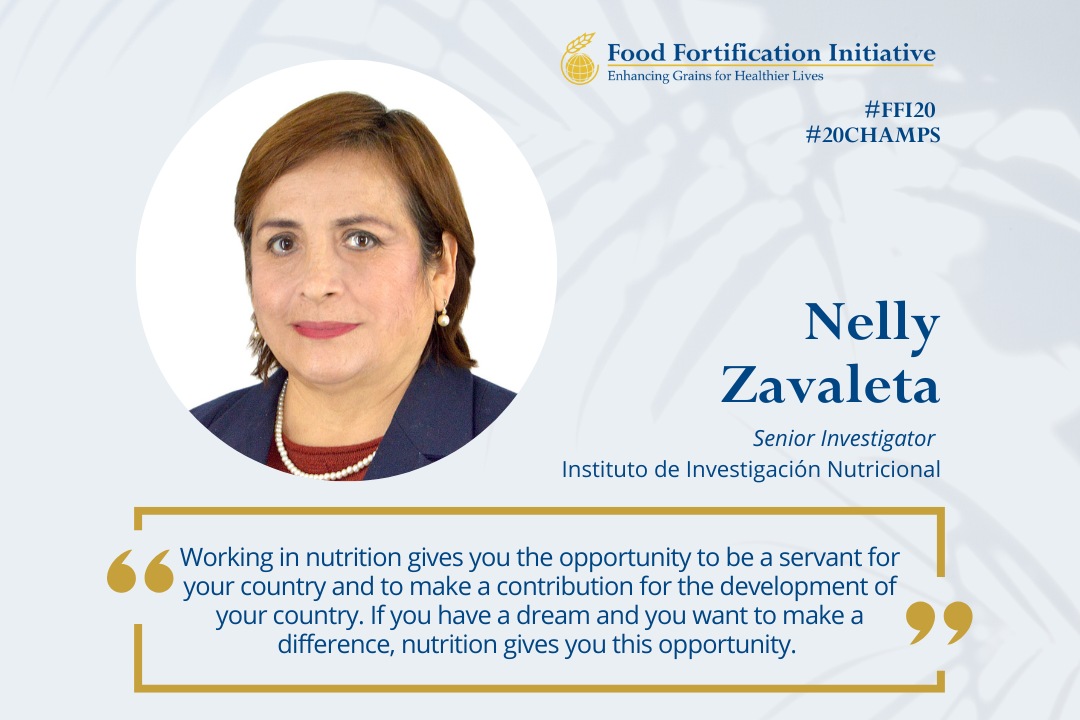Senior Investigator at Instituto de Investigación Nutricional

FFI: How did you become interested in nutrition?
Zavaleta: I have been interested in nutrition for a long time. I am a medical doctor and during my training in the Children´s Hospital, I attended to a lot of children who had illnesses related to malnutrition. I became more and more interested in malnutrition, and I started to dedicate my work to do research in maternal and infant nutrition, particularly in anemia and micronutrient deficiencies.
FFI: What inspired you to become involved with food fortification?
Zavaleta: At the Nutrition Research Institute, we investigate the causes and solutions of nutritional problems and also we participate in several forums to raise awareness of problems of malnutrition and to propose public policies. One of the main problems in my country and other countries is anemia, which affects development especially in children. There are many countries who have successfully implemented fortification programs and have controlled micronutrient deficiencies and anemia, so we now promote food fortification as a public health strategy to prevent anemia and other micronutrient deficiencies.
FFI: How is your country prioritizing fortification?
Zavaleta: In Peru, there have been successful experiences in fortification such as salt fortification with iodine, which was started in Peru 40 years ago. Peru was very successful in reducing iodine deficiencies with salt fortification. Twenty years ago, Peru was declared iodine deficiency-free by the United Nations. This success showed the effectiveness of the fortification program, which continues today.
FFI: What health outcomes do you expect fortification to improve in your country?
Zavaleta: Anemia is a public health problem that affects more young children [in Peru], but it also affects 20% of women of reproductive age as well as elderly people. Fortification has an advantage because it can improve the nutritional condition of any group of the population that consume [fortified foods]. The key factor is to select a food vehicle that is consumed by the population. In Peru a law has been recently passed for the fortification of rice with iron, zinc and 8 vitamins, the level of fortification of rice would provide approximately 40% of micronutrient recommendations for fertile age women and school children. We expect an important reduction of anemia and other micronutrient deficiencies. There is evidence that reduction of micronutrients deficiencies like zinc, folate, and vitamin A contribute to morbidity reduction.
FFI: In your experience, what are the main components to a successful fortification program?
Zavaleta: Political decision is a key factor but, before that, it is necessary data that supports that decision. Research contributes to providing evidence of nutrient deficiencies, the consequences, the selection of food vehicle, and the efficacy of interventions. Research is also necessary for monitoring and evaluation of the impact of the intervention.
FFI: What are the greatest challenges you have encountered in planning or implementing fortification programs? And how did you address those challenges?
Zavaleta: Monitoring is very important because we need to make sure the program is properly implemented. It is also important to evaluate the efficacy and the impact, because in the long term you may have a reduction of the deficiency, but without evaluation it will be difficult to attribute to [fortification], and difficult to sustain the program.
FFI: What can we do as a society to continue strengthening fortification efforts?
Zavaleta: Nutritional deficiencies vary from country to country and region to region, not every group is affected in the same way. It is important to define the objective of the program and to approach with the recommended food. I think each country has to design and implement the appropriate of fortification program starting from evaluation.
FFI: Is there anything else you would like to share?
Zavaleta: Working in nutrition gives you the opportunity to be a servant for your country and to make a contribution for the development of society. If you have a dream and you want to make a difference, nutrition gives you this opportunity.
This interview is part of the #FFI20 Champions campaign, a celebration of fortification heroes who have helped build a smarter, stronger, and healthier world by strengthening fortification programs over the past 20 years. To read interviews with other champions, visit the #FFI20 Champions campaign homepage.



